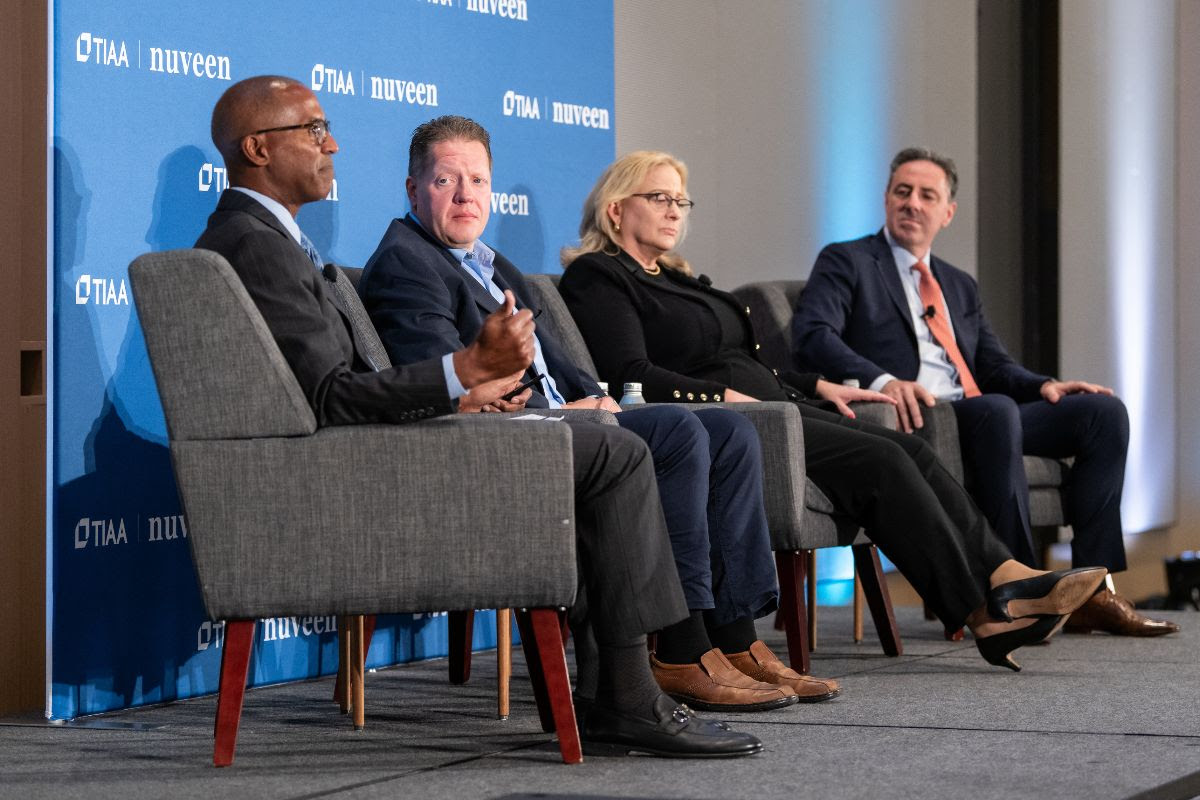 At TIAA's "Securing Retirement in America" event, (from l. to r.) Eric Stevenson, President of Nationwide Retirement Solutions; Jason Fichtner, Vice President and Chief Economist, Bipartisan Policy Center; Angela Antonelli, Executive Director, Georgetown University Center for Retirement Initiatives; and Nuveen's Brendan McCarthy.
At TIAA's "Securing Retirement in America" event, (from l. to r.) Eric Stevenson, President of Nationwide Retirement Solutions; Jason Fichtner, Vice President and Chief Economist, Bipartisan Policy Center; Angela Antonelli, Executive Director, Georgetown University Center for Retirement Initiatives; and Nuveen's Brendan McCarthy.
Recommended For You
The U.S. retirement system has become more of a savings system and less of an income system, which increases the risk that workers will outlive their savings.
This is according to panelists at TIAA's recent "Securing Retirement in America" event during a discussion led by Nuveen Head of Retirement Investing Brendan McCarthy focused on policies and private-sector solutions that help workers manage their savings throughout retirement.
According to a report by the TIAA Institute and George Washington University's Global Financial Literacy Excellence Center, only 35% of Americans know the average lifespan of retirees, a worrisome knowledge gap that can keep them from saving enough money to last as long as they live. This lack of "longevity literacy" impacts workers' long-term financial health, including how to plan for and afford living expenses in retirement and contributes to the concerning reality that 40% of Americans are projected to run short of savings in retirement.
The panel comes at a time when the industry is marking the 50th anniversary of the Employee Retirement Income Security Act (ERISA) in 2024. Legislation could be a key element to re-focusing the industry on decumulation strategies in addition to savings, as well as the benefits of annuities and other ways to ensure more workers have income that will be guaranteed to last throughout retirement, according to TIAA.
The bipartisan Lifetime Income for Employees Act, introduced in Congress last June, is an example of legislation that would enable more workers to achieve a financially secure retirement by improving access to lifetime income, said TIAA. The LIFE Act would direct the Secretary of Labor to amend the current Qualified Default Investment Alternative (QDIA) safe harbor regulations to allow, but not require, a QDIA to include as part of its mix of asset classes an "annuity fixed income component" that provides a guaranteed return on investments and the option to convert assets into a guaranteed lifetime income stream.
Co-sponsors Rep. Tim Walberg (R-MI) and Rep. Donald Norcross (D-N.J.) introduced the bill twice previously in 2020 and 2022. In a recent speech on the floor of the House of Representatives, Rep. Walberg spoke to the need for such legislation to secure Americans' retirements.
"This legislation would improve plan sponsors and investors' default lifetime income options and take a crucial step to help American retirees have adequate income in retirement," Rep. Walberg said. "Increasing the range of savings and income options will help provide workers with the possibility to achieve higher returns on their retirement investments and greater peace of mind that their income will last throughout retirement."
The bill was referred to the House Committee on Education and the Workforce in June, but no action has followed since then.
Related: The new conversation around annuities in the workplace
TIAA re-introduced its Retirement Bill of Rights in 2023, noting several concerning retirement trends including a projected shortfall in Social Security benefits and disparities in access to employer-sponsored retirement savings plans among underrepresented groups. The TIAA Retirement Bill of Rights calls for every worker to have access to low-cost investment options that provide ample income for a dignified retirement. It also says every worker deserves clear information that allows them to compare saving and income options, make informed choices, and meet their retirement goals, and calls for the public and private sectors to share responsibility for helping every worker access retirement income that will last the rest of their lives.
© 2025 ALM Global, LLC, All Rights Reserved. Request academic re-use from www.copyright.com. All other uses, submit a request to [email protected]. For more information visit Asset & Logo Licensing.







